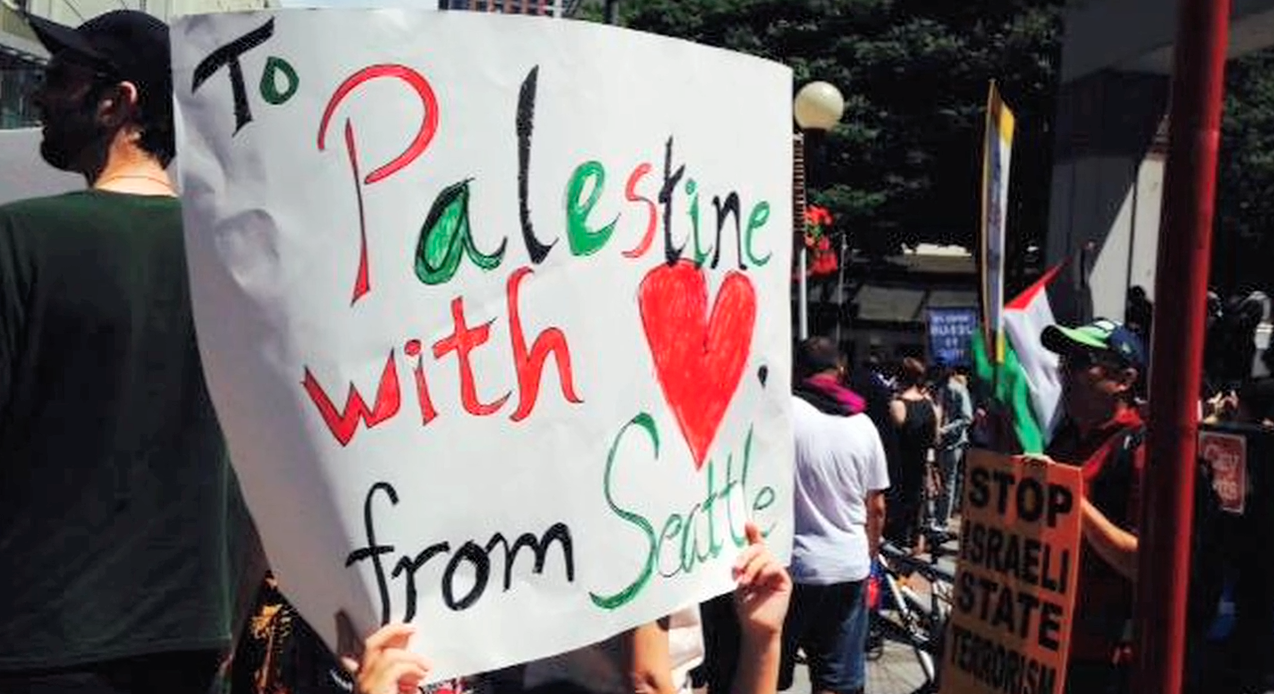Dean Spade’s documentary investigates Palestinian queer activists and their issues with the Israeli government
You might have heard the term ‘pinkwashing’ before or seen it in the media, but what you might not know is that there are multiple ways of interpreting it. The term is used by activists to describe a phenomenon in which countries claim to be gay-friendly in order to improve their international image. Some groups that support the Palestinian bid for an independent state have taken a stand against the Israeli government and consider its pro-LGBT rights campaign as a political distraction, used to cover up the occupation of Palestinian territories.

Dean Spade’s documentary Pinkwashing Exposed: Seattle Fights Back! tells the story of a group of Palestinian queer activists who are accusing the Israeli government of only showing one side of the country’s position on LGBTQ rights to people in the U.S.
QuAIA Seattle—Queers Against Israeli Apartheid—was established in January 2013 and the organization’s goal is to boycott anything that has a connection to the Israeli government in order to lay the foundation stone of Palestinian freedom. When a press release announced the meeting of the Seattle LGBT Commission and the Israeli LGBTQ leaders as part of an educational West Coast tour in March 2012, the activists decided to denounce an Israeli marketing campaign that the group refers to as pure propaganda. “Propaganda is not dialogue,” Palestinian BDS activist Nada Elia said after the major outcry that ensued from the Commission’s decision to cancel the event in Seattle.
The group positioned itself against the normalization of relations between perceived government oppressors and oppressed Palestinians. The boycott of what Dean Spade refers to as “Israeli Apartheid” is depicted in the documentary as a brilliant strategy by Palestinians against Israel. After the Seattle City Council was involved in cancelling the LGBT meeting, many LGBT and HIV organizations signed a letter critiquing the Commission’s judgement on the matter. This decision led to a clear division within LGBT communities, which is all documented in Spade’s film.
Spade himself is one of the queer activists and protagonists, which may be problematic as he fails to mention that Tel Aviv was ranked the best gay travel destination by Gaycities.com in 2011 and that former Israeli President Shimon Peres backed gay marriages during a state visit to Mexico in 2013.
Israel is objectively far ahead of the rest of the Middle East when it comes to gay rights, in stark comparison with Iran, Egypt and Palestine, as documented by journalists like Allyn Fisher in her 2013 article for the Huffington Post, “Nitzan Horowitz, Tel Aviv’s Gay Mayoral Candidate, Could Break New Ground In The Middle East.”
The city of Tel Aviv is known for its annual gay pride parade. A gay film festival and municipal centre is made available for the gay community—cultural and athletic programs for teenagers and young adults are among the services mentioned in the article. Mickey Gitzin, founder of Be Free Israel, considers there to be “a gap between the legal and social situation” of the country’s LGBT rights according to an article in The Times of Israel. In fact, the government recognizes adoptions and gay marriages performed abroad, but gay couples cannot marry, adopt children or have surrogate pregnancies in Israel according to the article.
Two distinct issues are mentioned in Spade’s documentary: LGBTQ rights and the occupation of Palestine. Most of the featured activists are both Palestinian and part of an LGBTQ community, and it’s easy to see why they would all converge towards the same cause. The comparison of LGBTQ rights should be made within the Middle East, but also within the rest of the world.
The director’s dissection of this group’s fight and media coverage exposes a new slant of the controversial Israeli-Palestinian conflict. Spade’s documentary goes back and forth between interviews with the activists and civil rights meetings where the group’s positions and goals are drastically questioned by members of the city councils and representatives of the Jewish community in Seattle. Even if opinions can strongly diverge, and these issues already get massive media exposure, Pinkwashing Exposed is an interesting insight into the groups’ definitions of pinkwashing, Brand Israel and normalization.
Catch Pinkwashing Exposed: Seattle Fights Back! on Monday, March 14 at 7 p.m. in room 110 of the Hall building.



